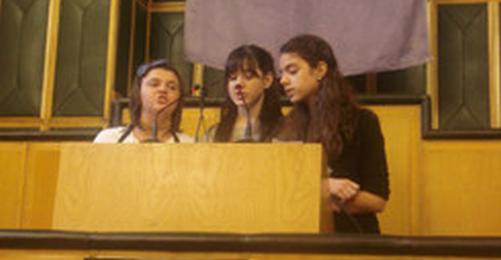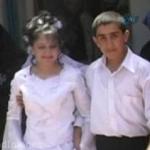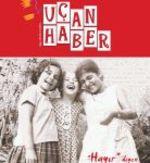The Flying Broom Women's Communication and Research Association has finished its project "Child Brides: Victims of Destructive Traditions and Patriarchal Social Heritage" after one year of study and research. The project was subsidised by the Sabancı Foundation. Its results were presented at the Turkish Grand National Assembly (TBMM) on 27 October.
Over the period of 18 months research was carried out in ten out of a total of 81 Turkish provinces pursuing the aim of counteracting marriages with underage brides.
The final sitting in parliament was organized with the support of the Parliamentary Commission for Equal Opportunities of Women and Men (KEFEK). Speeches were delivered by the Minister of Family and Social Politics, Fatma Şahin; the Chair of the Sabancı Foundation, Zerrin Koyunsağan; Öznur Çalık as the head of the 23rd term KEFEK Sub-commission on Research into early Marriage; Head of the 24rd term KEFEK Azize Sibel Gönül and Deputy Prime Minister Binnaz Toprak. Additionally, artist Burhan Şeşen performed the piece "Would you please hear my voice" together with a children's choir - a song composed especially for the project.
Information regarding the counteracting of early marriage and raising awareness was conveyed to 54 provinces in the scope of the project. Seminars were organized and interviews were held with the adult women and younger girls who attended the seminars. These meetings were also attended by teachers, social service experts, sociologists, psychologists, lawyers, physicians, journalists, local executives and representatives of non-governmental organizations.
The stories of the "child brides" were put together in a book entitled "Marriage is too big at young Age: Children Brides". The book contains the stories of women and executives of various institutions as elicited during the interviews in the provinces in the course of the project.
The Flying Broom Association also prepared the "Child Brides" documentary with footage from different provinces and special interviews as part of the project. The documentary approaches the topic under different aspects and reveals the dimensions of the problems behind the depicted life stories.
The stories of the Child Brides
A woman in her forties from Van (eastern Turkey) for example recalled her fear and worries during the beginning of her forced marriage:
"When I was 13 years old and everybody else went to school, I was made to marry a 30-year-old man. I had never seen him before and I did not know him at all. They made me marry him just because he was the son of a friend of my father's. When I saw this person it was as if he was my father. I did not get close to him and I was very afraid during the nights. I did not even enter his room. I always saw him like my father. I can still not get rid of this perception".
A young woman from Diyarbakır (south-eastern Anatolia) was not able to hold back her anger when she described what it meant to enter marriage when still being a child:
"I married when I was 15 years old. There is no description. You come into a big family and you don't know how to behave. When they come to ask [the parents] to give their daughter into marriage they say she should be young so they can teach her. I did not know for instance that I had to rise to my feet in front of the men so I was beaten the first time. I gave birth to my son when I was 16 years old. When I was 23 my husband passed away".
A young woman from Tekirdağ (north-western Turkey) drew attention to the fact that education was able to prevent girls from early marriage:
"I am the only girl in our whole family who studies. My maternal grandmother was married when she was 13 years old. She constantly talked about my [female] cousin at each and every family meeting. Saying 'Fatoş is left over at home, what are we going to do'. She was trying to find a husband for her. One day I pulled her leg and asked her why she did not talk about me. She replied, 'You are studying, you have saved your life'". (ÇT/VK)








